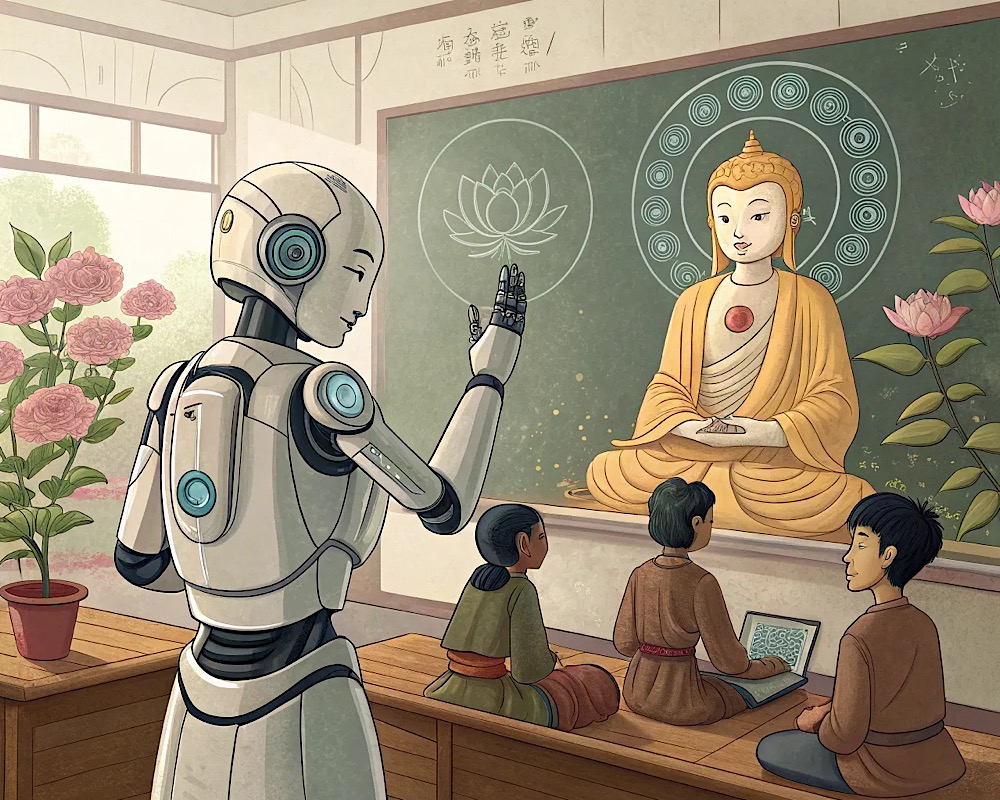BuddhaBot Plus: artificial intelligence to expand Buddhist knowledge in Bhutan
Monks and nuns of the Central Monastic Body will have a chatbot designed to answer questions, in English. The technology was created together with Japanese partners. An initial period of six months of experimentation is in the works, with full introduction by 2027.
Thimphu (AsiaNews) – In Bhutan, men and women religious are looking to modern technology to expand knowledge about their faith.
Monks and nuns at the Central Monastic Body will soon have access to BuddhaBot Plus, an AI-based chatbot designed to answer questions, in English, from a Buddhist perspective.
This is linked to generative AI and aims to encourage dialogue between Buddhists, by offering in-depth explanations on religious topics.
According to the creators, it is based on advanced deep learning models and generates high-quality and accurate answers by analysing data and writings contained in ancient texts.
BuddhaBot will offer nuns and monks the opportunity to expand their knowledge about Buddhism, while contributing to the spread of Buddhist doctrine or Dharma.
The initiative is part of a joint pilot project between the Central Monastic Body, Kyoto University, and Japanese Teraverse. An agreement to this effect was signed in Japan.
Under the deal, the parties will work together to test and improve the English version of BuddhaBot, create guidelines for use by Bhutan's monastic institutions, and gradually roll out the chatbot.
“As a pilot project, we have identified students from institutes such as Tango Buddhist College and the Institute of Science of Mind to begin using BuddhaBot,” said Choten Dorji, Secretary of the Council for Administration and Development Affairs, who was present at the signing.
“We will test it for six months, and if successful, we will expand it to other monastic institutions,” he explained.
In Bhutan, the Central Monastic Body plans to collaborate with the Ministry of Home Affairs and the Ministry of Education for a wider implementation of the project.
Initially developed in 2021 by a team from Kyoto University, the first version of BuddhaBot was made using a Japanese translation of the Sutta Nipata, one of the oldest collections of the Buddha's talks.
Later, the team upgraded the project by applying OpenAI's ChatGPT technology to create BuddhaBot Plus, which offers more in-depth interpretations and explanations of Buddhist teachings. The English version of BuddhaBot Plus was completed in 2023.
Seiji Kumagai, co-developer of BuddhaBot and professor at Kyoto University, points out that the chatbot opens new opportunities to access Buddhist teachings in ways that were previously unimaginable.
Bhutan is the first country outside Japan to experiment with the English version.
About 200 monks will test the artificial intelligence on an experimental basis while the full launch set for 2027. If successful, the programme could be extended to the secular communities in Bhutan and beyond.
“The old version of BuddhaBot provided the text of Buddhist scriptures in their original form, but it often struggled to offer clear, detailed answers,” Dr Kumagai said. “BuddhaBot Plus solves this by generating more comprehensive responses while preserving the Buddha’s original words.”
The potential impact of BuddhaBot Plus goes beyond religious education, since AI-generated interpretations of Buddhist thought could introduce new philosophical perspectives.
The platform also opens the door to broader applications, such as interfaith dialogue and the use of AI in economic management and analysis.
“By applying the algorithms of BuddhaBot to non-Buddhist texts, it is possible to create chatbots that generate management advice or simulate interfaith conversations,” Dr Kumagai said. “This could fundamentally transform how knowledge is shared across disciplines.”
07/04/2021 12:06
19/01/2019 09:35







.png)










